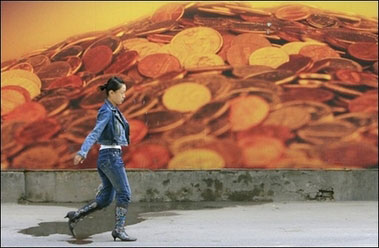China's WTO entry of great impact
(AFP)Updated: 2006-12-03 11:58
While few doubt the importance of the September 11 terrorist attacks, analysts say China's entry into the World Trade Organization three months later may eventually be seen as having even greater reverberations.
When China joined the WTO on December 11, 2001, it submitted to a universal set of rules, signing off sovereignty it had defended fiercely for millennia, said David Zweig at Hong Kong's University of Science and Technology.
 A woman walks past a construction site boarded off with a billboard showing currency coins in Beijing. [AFP]  |
"Unless the war on terror continues for a long time and has implications in terms of further foreign policy intervention by the US, then the long-term impact of China's entry into the WTO is greater," he said.
As the world's most populous nation marks the fifth anniversary of its entry into the global trade body, it is time for both the 1.3 billion Chinese themselves and the rest of the world to take stock of the changes.
For the well-heeled resident of Beijing or Shanghai, the advantages of WTO membership are obvious: His imported Mercedes is cheaper; his local Citibank offers more services; his Wal-Mart sells a wider variety of products.
But China's entry into the WTO has not just created winners. Reduced tariffs on agricultural produce have threatened the livelihoods of hundreds of millions of farmers.
Beyond affecting the individual lives of the Chinese, the WTO has also profoundly and irreversibly changed the Chinese economy as a whole.
"The biggest transformation has been in the volume of trade," said Li Zhongzhou, chief analyst at the Beijing-based EU-China Program for the Support of China's Integration into the World Trading System. "And it's not just exports that have gone up."
Overall trade as a percentage of the gross domestic product, a widely used measure of an economy's openness to the outside world, has risen from 44 percent in 2001 to 72 percent today.
By comparison, the value of US trade with the rest of the world is just 21 percent of its gross domestic product.
The greater openness that WTO membership has entailed has brought net advantages to the Chinese, but they may soon have to wave goodbye to the early, easy benefits of accession to the global trading system.
"Since China joined the WTO, its exports have grown at an average rate of 29 percent per year," said David Dollar, the World Bank country director for China.
"Part of that is an adjustment to a more open system. But it's very unlikely that exports can continue to grow at that rate, now that China is a very large player in the world market," he said.
Much has been made of the unemployment that China creates elsewhere with its hyper-efficient, hyper-cheap labor force. But China, too, has had to pay.
"In this period of expanding trade, every country has to make some adjustments. Some of its industries expand and other industries tend to contract," said Dollar.
"In China, for example, more than 100,000 people have been released from state-owned banks, as the state-owned banks adjust to this more competitive environment."
Anti-dumping cases against China have soared after its entry into the WTO, and it now accounts for one third of global cases, according to a recent count.
Some observers see this as the last defense put up by dying industries in the rich world before they succumb to the Chinese juggernaut.
"When you look at some of the cases against China, you do see very, very dramatic changes," said Cliff Stevenson, a British-based consultant and a recognized expert on anti-dumping cases.
"The industries on overseas markets suddenly find themselves with massive losses in market share. Sometimes that can be very disruptive," he said.
China's entry into the WTO has brought about monumental changes in global trade flows that it will take a long time to absorb, according to Stevenson.
The anti-dumping cases are part of a painful transition period as the world grapples with the one-off challenge of accommodating China's uniquely sized economy.
"It's quite hard to predict when the transition will be over, because I don't
think the world has ever seen anything like this before. We are talking about
more than the short to medium term," he said.
|
||
|
||
|
|